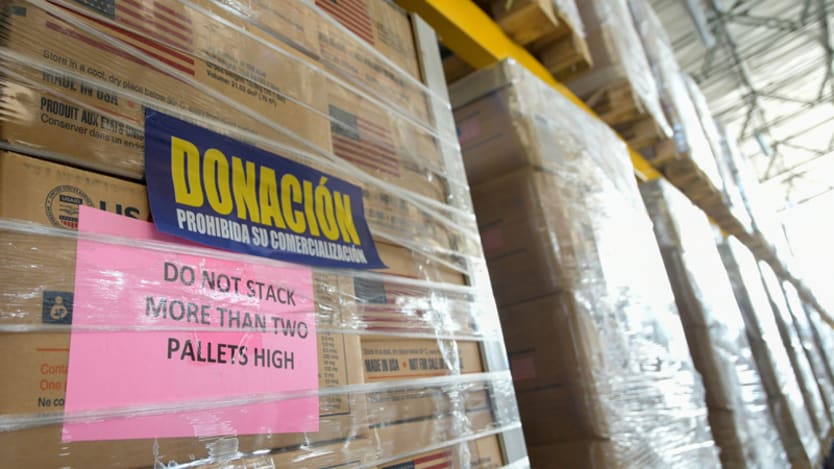
WASHINGTON — Perishable humanitarian assistance prepositioned by the United States on the Venezuelan border has been distributed inside Colombia, according to U.S. Special Envoy for Venezuela Eillott Abrams.
The supplies, which were mostly amassed in a warehouse in the border city of Cúcuta, Colombia, were meant to be distributed inside Venezuela. But doing so has been impossible for months, with Venezuelan President Nicolás Maduro barricading the bridge connecting the two countries to prevent supplies from getting in.
“The one rule we’ve had is that the aid has to go to people who need it, meaning it can’t be distributed by or given to the regime.”
— Eillott Abrams, U.S. special envoy for VenezuelaBoth Venezuelan refugees and migrants, in addition to local citizens receive the perishable items, Abrams said, while further supplies remain in the Cúcuta warehouse. He said some items, such as medical kits, had been moved out of Colombia to other places and “then there were some arrangements to get them into Venezuela,” but he did not elaborate.
“The one rule we’ve had is that the aid has to go to people who need it, meaning it can’t be distributed by or given to the regime because we know very well that the regime will use it for political purposes. So the church, the Red Cross, Caritas, any NGOs that are reliable would be fine ways to distribute aid,” Abrams said. “The barrier to having more humanitarian aid is the regime’s refusal to accept it and the regime’s waste of resources that could be dedicated to getting these kinds of goods for the people of Venezuela.”
The U.S. has also prepositioned aid in Brazil and the Caribbean island of Curaçao, poised to enter Venezuela.
Although the border with Colombia reopened on June 8 — after Maduro closed it in February amid efforts from the opposition government led by interim President Juan Guido to push humanitarian assistance into Venezuela — distribution has remained limited. Maduro has allowed the International Committee of the Red Cross, which had 98 staff as of April, to expand operations inside the country.
The USNS Comfort, an America military ship, left last week for a five-month voyage in Latin America to provide medical services to Venezuelan migrants and refugees in Latin America. The ship has examination rooms as well as operating and x-ray equipment and blood banks, and is staffed by 1,000 crew members.
At the invitation of Maduro, United Nations High Commissioner for Human Rights Michelle Bachelet visited the country last week, the first such visit by a commissioner to Venezuela. She said last Friday that the U.N. Human Rights Office had reached an agreement with the government to leave a small staff presence to continue monitoring the human rights situation and provide technical assistance. The government promised full access to detention facilities, Bachelet said.
Abrams lauded the U.N. work and condemned the human rights situation inside Venezuela, where he said there are 715 people arbitrarily detained.
“We hope that her report, which is due out July 5, will reveal the brutal truths that victims of the regime suffer every day,” Abrams said. “We hope the report will call, as so many democracies around the world have, for free elections as a central part of the solution to Venezuela’s crisis.”
According to the UN Refugee Agency, more than 4 million Venezuelans — more than 10% of the country’s population — have now fled the country experiencing record inflation and shortages of basic goods such as food and medicine. The majority have migrated to other countries in Latin America, with the most currently being hosted by Colombia.
Abrams said he expects more Venezuelans to come to the U.S. and the Trump administration is considering providing temporary protected status for Venezuelans. The designation would allow those already in the U.S. the legal status to remain due to conditions in their home country.








